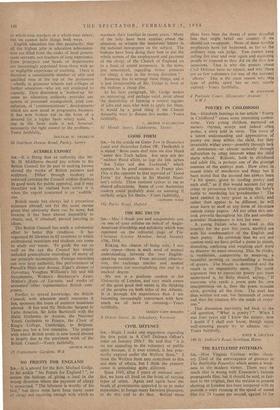SIR,--Elizabeth Jennings in her article " Poetry in Childhood" raises
some interesting contro- versy. Very young children, nurtured on nursery rhymes, accept and indeed often prefer, a story told in verse. The roots of a latent understanding and appreciation of poetry are deep within the child, but they invariably wither away--possibly through lack of sustenance—or ,almost certainly through suffocation by other interestt when the child starts school. Ridicule, both in childhood and adult life, is perhaps one of the greatest enemies of the embryo poet. How often in , recent trials of murderers and thugs has it been stated that the accused has alvrays been "a bit queer, given to reading poetry and such stuff," as if this would account for any crime or perversion from pinching the baby's bottle to murdering his "grandmother ? The herd instinct is very great in a child, and rather than appear to he different, he will soon learn to scoff at any form of literature outside comic papers. All too often this out- look prevails throughout his life and another potential Shakespeare is lost for ever.
A young Italian who has lived in this country for the past five years, startled me with his condemnation of the English and their poetry. He contends that we are not content until we have pulled a poem to pieces, dissecting, analysing and weighing each word to discover its exact meaning. This, he thinks, is vandalism, comparable to smearing a beautiful painting or manhandling a bunch of grapes. The bloom is destroyed and the result is an unpalatable mess. The stock argument that to appreciate poetry you must understand it, he flatly denied, saying., "If everyone who reads a poem puts his own interpretation on it, then the poem remains alive, growing all the time. The poet has then written not one, but thousands of poems and thus his creation fills the needs of every- one."
JOYCE B. CROCKER 140 Si. Andrew's Road, Southsea, Hants


































 Previous page
Previous page